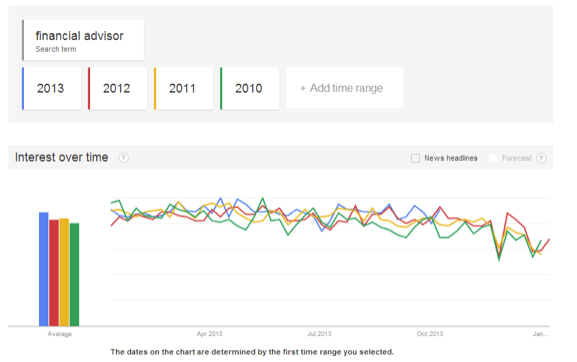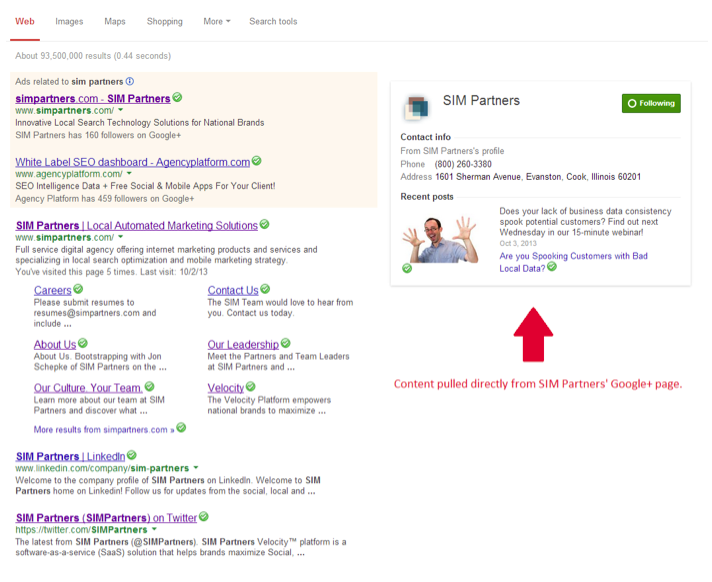Ten years ago, friends and family served as the top source most consumers turned to when searching for product or service recommendations. Today they turn to their preferred search engine. Here they find Web sites, social sites and a variety of directory listings, all of which increasingly include customer reviews. Combined with the fact that search engine results almost universally return localized results first, the importance of a strong digital presence could be a determining factor in the success of any local business, especially for financial advisors. In fact, searches for the phrase “financial advisor” on Google have reached a four-year high.

Source: www.google.com/trends
Customers want a local advisor whom they can visit if they have a need for and especially want an advisor they know they can trust. A strong local digital presence can lay the early groundwork for both. While the steps for establishing and maintaining an impactful digital presence aren’t complicated, they are often overlooked. True, the process can be time consuming, but when done correctly it can pay major dividends by helping keep the new business pipeline full.
Steps To Improve An Online Presence
By focusing on three mission-critical components for ensuring a strong online presence, financial advisors will ensure that they’re easily found, vetted and readily available to any prospective customers.
Claim your most important listings. A number of online directories exist in which business information is listed, including YP, Yelp, Google, Bing, Yahoo! and CitySearch. Is your business listed in each? If not, claim your listing immediately.
Ensure that directory listings are accurate. Maybe listings have already been created in a few of the online directories, or maybe you spent time claiming listings in the past. But do they still appear to be accurate? Phone numbers and office locations can change frequently, and each time they do, listings need to be updated. If you fail to do so, potential leads could easily be lost.
Create and maintain social media pages. While directory listings are critical for helping potential customers locate you, social media pages provide an equal or greater opportunity to boost online visibility. They of course offer a valuable avenue for public communication, but did you know they also play a role in increasing visibility on search engine result pages? It's surprising to many, but true: Social content is routinely integrated into search results.
So which are the most important social pages?
• Google+ Local
Google+ has become the social layer to Google’s organic search results. Google now uses social signals (i.e., “+1’s” from those within your circles) as a method of weighing the relevancy of search results. Google incorporates content from Google+ Local pages in its search engine results, local business listings and maps.

• Facebook
In recent years, the social network that began as a student-only club has become increasingly business-focused. It now offers business pages to help local reps and businesses brand and connect directly with consumers, and it recently debuted a new search feature known as Graph Search. This returns highly personalized content from the searcher’s own personal network (social graph). By tapping into a searcher’s social graph, Facebook searches for people, photos, video pages, places, etc. Anything shared publicly or shared with the person conducting the search on Facebook is considered. Think of Graph Search as Facebook’s recommendation engine.
Support From Corporate?
It may be difficult to imagine where in your busy schedule you’ll find the time to claim and check directory listings for accuracy, as well as establish and maintain a presence on multiple social pages. Luckily for a number of financial advisors that their parent companies sometimes offer tech solutions to automate the process and ease the burden. If you’re not sure if a parent company provides a software solution, ask the corporate marketing director if one is available, or could be made available. If the director does provide one, be sure to ask if it includes both social CRM and listings management components.
At first, many advisors are unfamiliar with how to use the software that’s provided, so be sure to ask pertinent questions including:
• What listings and sites are covered?
• Does it manage both directory listings and social sites?
• Does it offer search engine optimization?
• Does it include corporate branded content available for your local use?
• Is it industry compliant?
If your parent company doesn’t offer a tech solution, be sure and ask for one, or ask if the budget is available for one.
For independent financial advisors, don’t worry, there are a number of affordable tech solutions for small businesses that can address these issues and reduce the time and frustrations with automation.
The Manual Route
Even if corporate doesn’t offer a technical solution, or if the solution did not make the budget this year, advisors without access to one should still maintain listings and social sites because the benefits are too great to ignore. Advisors should be sure to set aside two one-hour windows each week and commit to investing that time to boost visibility by creating relevant and engaging social content with community-targeted messages. They should also review listings every X months for accuracy. For financial advisors working for a corporate brand, once you’ve achieved success the manual way, it’ll be easier to make the case for a corporate-provided automation solution.
Jon Schepke is President and Founder of SIM Partners (www.SIMPartners.com). SIM Partners technology empowers major brands to maximize digital marketing results at a local level. Contact Jon at [email protected].